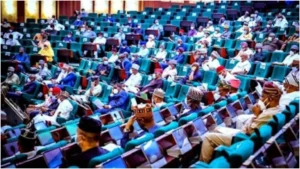
The House of Representatives Committee on Finance on Monday, directed the Industrial Training Fund (ITF) to explain the variance of over N12 billion in their budget as of December 31, 2022.
Reps also questioned the ITF’s operating expenditure of N39.8 billion, juxtaposed with total revenue of N45.1 billion, all while the organization maintained a staff of only 2,691 nationwide.
The legislature further urged the Nigeria Electricity Regulatory Commission (NERC) to clarify why it registered a company lacking the capability to deliver yet received N39 billion for the provision of prepaid meters to consumers.
Chairman of the House Committee on Finance, Rep. James Falake, issued the directive during the interactive session in Abuja, where the management of ITF presented the 2024-2026 Medium Term Expenditure Framework and Fiscal Strategy Paper.
Expressing deep concern, he pointed out the failure of the Industrial Training Fund (ITF) management to pursue revenue generation from the vast number of over 128,000 private and public quoted companies in Nigeria.
After thorough scrutiny of different financial statements provided to the Committee, Hon. Faleke questioned the discrepancy in comparison to the audited report submitted by ITF, exposing a deficit surpassing N12 billion.
Furthermore, Faleke questioned the ITF’s operating expenditure of N39.8 billion, juxtaposed with total revenue of N45.1 billion, all while the organization maintained a staff of only 2,691 nationwide.
He warned that If ITF failed to account for the difference after 24 hours, it would be forced to refund the entire N3 billion to government coffers.
Mrs Safiya Mansur, Director of Finance and Accounts, ITF, said the fund sourced its revenue from the one per cent training contributions from public and private companies.
According to her, there are 128,000 registered companies contributing employers to the ITF, out of which only 57,000 are up to date in their contributions.
To ensure compliance, she said, the ITF intensified monitoring of the defaulting companies, where some resorted to litigation but was later resolved due to the intervention of the previous house committee.
Meanwhile, Falake urged the Nigeria Electricity Regulatory Commission (NERC) to clarify why it registered a company lacking the capability to deliver yet received N39 billion for the provision of prepaid meters to consumers.
Faleke said a company, Ziglasis, was contracted by the Federal Ministry of Power and paid N39 billion to supply prepaid meters but failed to do so after collecting the money for the project.
The committee queried the Electricity regulator for licensing the company which has not delivered on the contract if signed and collected taxpayers’ money.
He asked the vice Chairman of NERC, Mr Musiliu Oseni to bring the Managing Director of Ziglasis and officials of the Ministry of Power before the House on Nov 14 to explain why the company had not delivered on the contract.